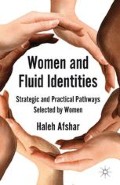Abstract
Too often women are defined by ascribed identities that confine them to categories developed and used by others. These constrain their participation in the political process and access to economic and social resources. To succeed, women across the world continue to develop fluid identities (Abrahams 1996; Afshar 1989, 1994) that enable them to be effective both at the domestic and public levels. The static, negative identities ascribed to them place socioeconomic and political barriers in their path that may seem, at the first instance, to be insurmountable. The limitations that they impose mask, undermine, and devalue the rich diversities and the gamut of daily strategies that pave the paths of women across differing and fluid identities as they accommodate the needs of their daily lives. But, as the case studies in this volume indicate, for many women, identities are not merely choices (Sen 2009) or clearly delineated fragmented facets of selves. Identity can be ascribed rather than chosen (Parekh 2009), and women have to negotiate and struggle to move beyond the stranglehold placed on them by such ascriptions. Women recognize identities as dynamic and malleable and are able to use differing interpretations to move beyond the limitations imposed in the name of specific faiths, cultures, or socioeconomic norms. Many reconceptualize their understanding of self and move beyond boundaries that remain fluid, hard to define, and culturally and historically constructed and reconstructed within specific socioeconomic contexts (Baumann 1996, 1997).
Access this chapter
Tax calculation will be finalised at checkout
Purchases are for personal use only
Preview
Unable to display preview. Download preview PDF.
References
Abrahams, Naomi. (1996) ‘Negotiating Power, Identity, Family and Community: Women’s Community Participation’. Gender & Society 10(6): 768–96.
Afshar, Haleh. (2001) ‘Women and the Politics of Fundamentalism in Iran’. In Feminism and ‘Race’, edited by K. Bhavnani, 348–65. New York: Oxford University Press.
Afshar, Haleh. (1994) ‘Values Real and Imaginary and Their Ascription to Women: Some Remarks about Growing Up with Conflicting Views of Self and Society Amongst Muslim Families in West Yorkshire’. In The Dynamics of Race and Gender in Britain, edited by Haleh Afshar and Mary Maynard. London: Taylor and Francis.
Afshar, Haleh. (1989) ‘Gender Roles and the “Moral Economy of Kin” Among Pakistani Women in West Yorkshire’. New Community 15(2): 211–25.
Afshar, Haleh. (1988) ‘Women, State and Ideology in Iran’. Women Living Under Muslim Laws, Dossier 3, June–July, 42–8.
Al-e Ahmad, Jalal (1982). Plagued by the West (Gharbzadegi), translated by Paul Sprachman. Delmor, NY: Center for Iranian Studies, Columbia University.
Baumann, Gerd. (1996) Contesting Culture: Discourses of Identity in Multi-Ethnic London. Cambridge: Cambridge University Press.
Baumann, Gerd. (1997) ‘Dominant and Demotic Discourses of Culture: Their Relevance to Multi-Ethnic Alliances’. In Debating Cultural Hybridity: Multicultural Identities and the Politics of Anti-racism, edited by P. Werbner and T. Modood. London: Zed.
Ellison, Ralph. (1952) Invisible Man. New York: Random House.
Johnson, Susan, and Ben Rogaly. (1997) Microfinance and Poverty Reduction. Oxford: Oxfam.
Parekh, Bhikhu. (2009) ‘Clearing the Fog’. Politics, Philosophy & Economics 3(8): 289–90.
Rattansi, A. (2000) ‘On Being and Not Being Brown/Black British: Racism, Class, Sexuality and Ethnicity in Post-imperial Britain’. Interventions: International and Post-Colonial Studies 2(1): 118–34.
Runnymede Trust. (1997) Commission on British Muslims and Islamophobia, Islamophobia: a Challenge for Us All, Report of the Runnymede Trust Commission on British Muslims and Islamophobia London: Runnymede Trust.
Sen, Amartya. (2009) ‘The Fog of Identity’. Politics, Philosophy & Economics 8(3): 285–8.
Women’s National Commission (WNC). (2006.) She Who Disputes. http://www.thewnc.org.uk/publications/doc_details/356-she-who-disputes-.html
Editor information
Editors and Affiliations
Copyright information
© 2012 Haleh Afshar
About this chapter
Cite this chapter
Afshar, H. (2012). Fluidities of Identities: Some Strategic and Practical Pathways Selected by Women. In: Afshar, H. (eds) Women and Fluid Identities. Palgrave Macmillan, London. https://doi.org/10.1057/9781137265302_1
Download citation
DOI: https://doi.org/10.1057/9781137265302_1
Publisher Name: Palgrave Macmillan, London
Print ISBN: 978-1-349-33950-1
Online ISBN: 978-1-137-26530-2
eBook Packages: Palgrave Social Sciences CollectionSocial Sciences (R0)

